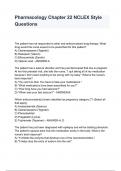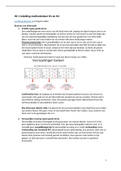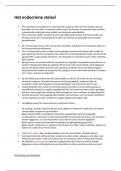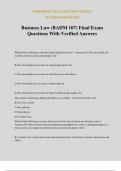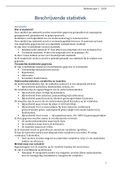International law – treaties and cases per week
Week 1 – Actors in the international legal stage
Core documents
- UN Charter, EIL 105 (93)
- GA Resolution 1514, EIL 121 (109) – Independence of colonial countries: limit, see article 6 – this
resolution was the basis for decolonization after 1960. Article 5: only colonies essentially.
- GA Resolution 2625, EIL 128 (121) – Friendly relations between states: principle of sovereign
equality of states. Again: non-disturbance of territorial integrity of a state! Only an end to
colonialism
- Reparation for Injuries Case, Advisory Opinion, ICJ Reports 1949, EIL 656 (631) – legal personality of
IOs + IOs powers: those powers essential to the performance of its duties.
- Western Sahara Case, Advisory Opinion, ICJ Reports 1975, paras. 54-59, NESTOR – non-self
governing territories have the right to self-determination. Thus, colonies.
- Case Re Secession of Quebec, Supreme Court of Canada, 1998, paras. 3 and 109- 146, NESTOR:
1 – Quebec cannot secede from Canada unilaterally; however, a clear vote on a clear question to
secede in a referendum should lead to negotiations between Quebec and the rest of Canada for
secession.
2 – international law does not specifically grant component parts of sovereign states the legal right to
secede unilaterally from their parent state.
There is no right nor denial in international law to the right of self-determination, except when it
comes to colonial peoples. Importance of territorial integrity of the state. International law expects
that it is only colonial peoples who can exercise the right to self-determination.
What can be exercised: internal self-determination. Secession can then only be possible if the
people are blocked from exercising their internal right to self-determination.
- Kosovo Advisory Opinion, ICJ 2010, paras. 1, 79-84, 22 July 2010, EIL 703 (678) – right to self-
determination – no general prohibition against unilateral declarations of independence may be
inferred from the practice of the SC. BUT: the case is unclear when it comes to non-colonial peoples
(component parts of sovereign states)
Wall case: para. 88, 118, 122, 156 – self-determination is a right erga omnes – existence of a
palestinian people recognized
Resolution 61/295: p. 128: respect for territorial integrity of states.
Additional documents related to the lecture
- GA Resolution 67/19, 20 Nov. 2012, Status of Palestine in the United Nations EIL 135 (128) and on
NESTOR - S/2011/705 : Palestine is a non-member observer state of the UN.
(11 November 2011): Report of the Committee on the Admission of New Members concerning the
application of Palestine for admission to membership in the United Nations EIL 132 (127) and on
NESTOR
- Documents related to the accession of Palestine to the International Criminal Court (ICC) (NESTOR)
Week 2:
- Art. 38, Statute of the International Court of Justice, EIL 115 (103)
- North Sea Continental Shelf Cases, ICJ Reports 1969, EIL 495 (470) – customary law when little time
has had to accrue, para. 74 + opinio juris, para. 77 – customary law is binding upon 3 rd states
- Military and Paramilitary Activities in and Against Nicaragua (Merits) (Nicaragua v. United States of
America), ICJ Reports 1986, paras. 183-193 EIL 519 (493) – practice to demonstrate customary law and
its conditions The Court concluded that principles such as those of the non-use of force, non-
intervention, respect for the independence and territorial integrity of States, right of collective self-
defense and the freedom of navigation, continue to be binding as part of customary international
, law, “despite the operation of provisions of conventional law in which they have been incorporated.”
(paras 191-193). 190: importance of judicial decisions in identifying customary law
- Legality of the Threat or Use of Nuclear Weapons, Advisory Opinion (General Assembly), ICJ Reports
1996, paras. 64-73, EIL 666 (641): para. 70: Normative value of GA resolutions; but importance of
opposing votes + how are the votes explained. para. 72: in order for something to be a ‘treaty’ it must
be drafted to be potentially normative in character
- Charter of the United Nations, Art 103, EIL 105 (93)
- Vienna Convention on the Law of Treaties, EIL 138 (131)
- Nuclear test case: para. 43: unilateral declarations as a source of law not in art. 38 – para 44: treaty:
intention must be binding
Jus cogens is a fundamental principle of international law that is accepted by the international
community of states as a norm from which no derogation is permitted.
Res inter alios acto: a contract cannot adversely affect the rights of one who is not a party to the
contract (unless it becomes customary: Continental shelf para. 71)
Hierarchy between treaties/ treaty regimes:
Lex specialis deogat lex generali: if two laws govern the same situation, a law governing a
specific subject matter overrides the law only governing general matters
Lex posterior derogat legi priori – the younger law overriding the older law.
Jus cogens – art. 53 VCLT
Week 3: (= state immunity;jurisdiction: based on the sovereign equality of states UN art.2!)
PCIJ, The case of the SS “Lotus”, paras. 2, 41, 44-46, 47, EIL 486 (461)in essence: a states
jurisdiction only extends throughout the territory of the state – jurisdiction of states extends
beyond the territorial: sovereign states may act in any way they wish so long as they do
not contravene an explicit prohibition – there has to be a link! The case is an example of
objective territorial jurisdiction
Case Concerning the Arrest Warrant of 11 April 2000, ICJ Reports 2002, paras. 45-71,
EIL 553 (528): VCDR = customary international law, as well as VCCR(52). Immunities are
granted for effective performance of functions (53). 51: certain holders of high-ranking
office in a state have immunity ratione personae. 53: freedom of travel. 54: immunity
ratione personae for a Minister of Foreign Affairs and other high ranking officials.
55: doesn’t matter whether the crime was an official act or not or whether it was
performed before the person entered into office. 58: no exception to immunity under
customary law for war crimes or crimes against humanity. 60: immunity is not impunity: it
cannot exonerate the person from all criminal responsibility. Para 61: exceptions to
immunity. 70: Belgium was in the wrong to issue the warrant. Universal principle: war
crimes, genocide example
Case Concerning the Arrest Warrant, ICJ Reports 2002, Joint Separate Opinion of Judges Higgins,
Kooijmans and Buergenthal, paras 70, 71, 75, 78, 83-85, EIL 566 (540) and NESTOR – 85: need to
scrutinize better whether the act performed was an official act or not, as for non-official acts in
the case of war crimes and crimes against humanity, immunity shouldn’t persist.
Convention against Torture and Other Cruel, Inhuman and Degrading Treatment or Punishment,
Articles 1, 4-7, EIL 226 (219): art. 5: jurisidictional principles
Vienna Convention on Diplomatic Relations, EIL 165 (158)
Convention on the Privileges and Immunities of the United Nations, EIL 163 (156)
UN Convention on Jurisdictional Immunities of States and Their Property, EIL 171 (164)
Al-Adsani v. United Kingdom, ECtHR 2001, paras. 60-67 NESTOR (EIL 2015, 698): Torture
prohibition has attained the status of a peremptory norm or jus cogens. State does have immunity
even in acts such as torture.
Jurisdictional Immunities of the State (Germany v. Italy: Greece intervening), Judgment of 3
February 2012, paras. 52-108, 139, EIL 625 (600) and NESTOR: rejection of territorial tort by
armed forces (78-9) and a more expansive exception to state immunity in regards to human rights
violations (jus cogens not an exception(97)). 56: state immunity is customary international law.
61: it derives from the sovereign equality of all states. It was about acta jure imperii. In Germany
Week 1 – Actors in the international legal stage
Core documents
- UN Charter, EIL 105 (93)
- GA Resolution 1514, EIL 121 (109) – Independence of colonial countries: limit, see article 6 – this
resolution was the basis for decolonization after 1960. Article 5: only colonies essentially.
- GA Resolution 2625, EIL 128 (121) – Friendly relations between states: principle of sovereign
equality of states. Again: non-disturbance of territorial integrity of a state! Only an end to
colonialism
- Reparation for Injuries Case, Advisory Opinion, ICJ Reports 1949, EIL 656 (631) – legal personality of
IOs + IOs powers: those powers essential to the performance of its duties.
- Western Sahara Case, Advisory Opinion, ICJ Reports 1975, paras. 54-59, NESTOR – non-self
governing territories have the right to self-determination. Thus, colonies.
- Case Re Secession of Quebec, Supreme Court of Canada, 1998, paras. 3 and 109- 146, NESTOR:
1 – Quebec cannot secede from Canada unilaterally; however, a clear vote on a clear question to
secede in a referendum should lead to negotiations between Quebec and the rest of Canada for
secession.
2 – international law does not specifically grant component parts of sovereign states the legal right to
secede unilaterally from their parent state.
There is no right nor denial in international law to the right of self-determination, except when it
comes to colonial peoples. Importance of territorial integrity of the state. International law expects
that it is only colonial peoples who can exercise the right to self-determination.
What can be exercised: internal self-determination. Secession can then only be possible if the
people are blocked from exercising their internal right to self-determination.
- Kosovo Advisory Opinion, ICJ 2010, paras. 1, 79-84, 22 July 2010, EIL 703 (678) – right to self-
determination – no general prohibition against unilateral declarations of independence may be
inferred from the practice of the SC. BUT: the case is unclear when it comes to non-colonial peoples
(component parts of sovereign states)
Wall case: para. 88, 118, 122, 156 – self-determination is a right erga omnes – existence of a
palestinian people recognized
Resolution 61/295: p. 128: respect for territorial integrity of states.
Additional documents related to the lecture
- GA Resolution 67/19, 20 Nov. 2012, Status of Palestine in the United Nations EIL 135 (128) and on
NESTOR - S/2011/705 : Palestine is a non-member observer state of the UN.
(11 November 2011): Report of the Committee on the Admission of New Members concerning the
application of Palestine for admission to membership in the United Nations EIL 132 (127) and on
NESTOR
- Documents related to the accession of Palestine to the International Criminal Court (ICC) (NESTOR)
Week 2:
- Art. 38, Statute of the International Court of Justice, EIL 115 (103)
- North Sea Continental Shelf Cases, ICJ Reports 1969, EIL 495 (470) – customary law when little time
has had to accrue, para. 74 + opinio juris, para. 77 – customary law is binding upon 3 rd states
- Military and Paramilitary Activities in and Against Nicaragua (Merits) (Nicaragua v. United States of
America), ICJ Reports 1986, paras. 183-193 EIL 519 (493) – practice to demonstrate customary law and
its conditions The Court concluded that principles such as those of the non-use of force, non-
intervention, respect for the independence and territorial integrity of States, right of collective self-
defense and the freedom of navigation, continue to be binding as part of customary international
, law, “despite the operation of provisions of conventional law in which they have been incorporated.”
(paras 191-193). 190: importance of judicial decisions in identifying customary law
- Legality of the Threat or Use of Nuclear Weapons, Advisory Opinion (General Assembly), ICJ Reports
1996, paras. 64-73, EIL 666 (641): para. 70: Normative value of GA resolutions; but importance of
opposing votes + how are the votes explained. para. 72: in order for something to be a ‘treaty’ it must
be drafted to be potentially normative in character
- Charter of the United Nations, Art 103, EIL 105 (93)
- Vienna Convention on the Law of Treaties, EIL 138 (131)
- Nuclear test case: para. 43: unilateral declarations as a source of law not in art. 38 – para 44: treaty:
intention must be binding
Jus cogens is a fundamental principle of international law that is accepted by the international
community of states as a norm from which no derogation is permitted.
Res inter alios acto: a contract cannot adversely affect the rights of one who is not a party to the
contract (unless it becomes customary: Continental shelf para. 71)
Hierarchy between treaties/ treaty regimes:
Lex specialis deogat lex generali: if two laws govern the same situation, a law governing a
specific subject matter overrides the law only governing general matters
Lex posterior derogat legi priori – the younger law overriding the older law.
Jus cogens – art. 53 VCLT
Week 3: (= state immunity;jurisdiction: based on the sovereign equality of states UN art.2!)
PCIJ, The case of the SS “Lotus”, paras. 2, 41, 44-46, 47, EIL 486 (461)in essence: a states
jurisdiction only extends throughout the territory of the state – jurisdiction of states extends
beyond the territorial: sovereign states may act in any way they wish so long as they do
not contravene an explicit prohibition – there has to be a link! The case is an example of
objective territorial jurisdiction
Case Concerning the Arrest Warrant of 11 April 2000, ICJ Reports 2002, paras. 45-71,
EIL 553 (528): VCDR = customary international law, as well as VCCR(52). Immunities are
granted for effective performance of functions (53). 51: certain holders of high-ranking
office in a state have immunity ratione personae. 53: freedom of travel. 54: immunity
ratione personae for a Minister of Foreign Affairs and other high ranking officials.
55: doesn’t matter whether the crime was an official act or not or whether it was
performed before the person entered into office. 58: no exception to immunity under
customary law for war crimes or crimes against humanity. 60: immunity is not impunity: it
cannot exonerate the person from all criminal responsibility. Para 61: exceptions to
immunity. 70: Belgium was in the wrong to issue the warrant. Universal principle: war
crimes, genocide example
Case Concerning the Arrest Warrant, ICJ Reports 2002, Joint Separate Opinion of Judges Higgins,
Kooijmans and Buergenthal, paras 70, 71, 75, 78, 83-85, EIL 566 (540) and NESTOR – 85: need to
scrutinize better whether the act performed was an official act or not, as for non-official acts in
the case of war crimes and crimes against humanity, immunity shouldn’t persist.
Convention against Torture and Other Cruel, Inhuman and Degrading Treatment or Punishment,
Articles 1, 4-7, EIL 226 (219): art. 5: jurisidictional principles
Vienna Convention on Diplomatic Relations, EIL 165 (158)
Convention on the Privileges and Immunities of the United Nations, EIL 163 (156)
UN Convention on Jurisdictional Immunities of States and Their Property, EIL 171 (164)
Al-Adsani v. United Kingdom, ECtHR 2001, paras. 60-67 NESTOR (EIL 2015, 698): Torture
prohibition has attained the status of a peremptory norm or jus cogens. State does have immunity
even in acts such as torture.
Jurisdictional Immunities of the State (Germany v. Italy: Greece intervening), Judgment of 3
February 2012, paras. 52-108, 139, EIL 625 (600) and NESTOR: rejection of territorial tort by
armed forces (78-9) and a more expansive exception to state immunity in regards to human rights
violations (jus cogens not an exception(97)). 56: state immunity is customary international law.
61: it derives from the sovereign equality of all states. It was about acta jure imperii. In Germany


